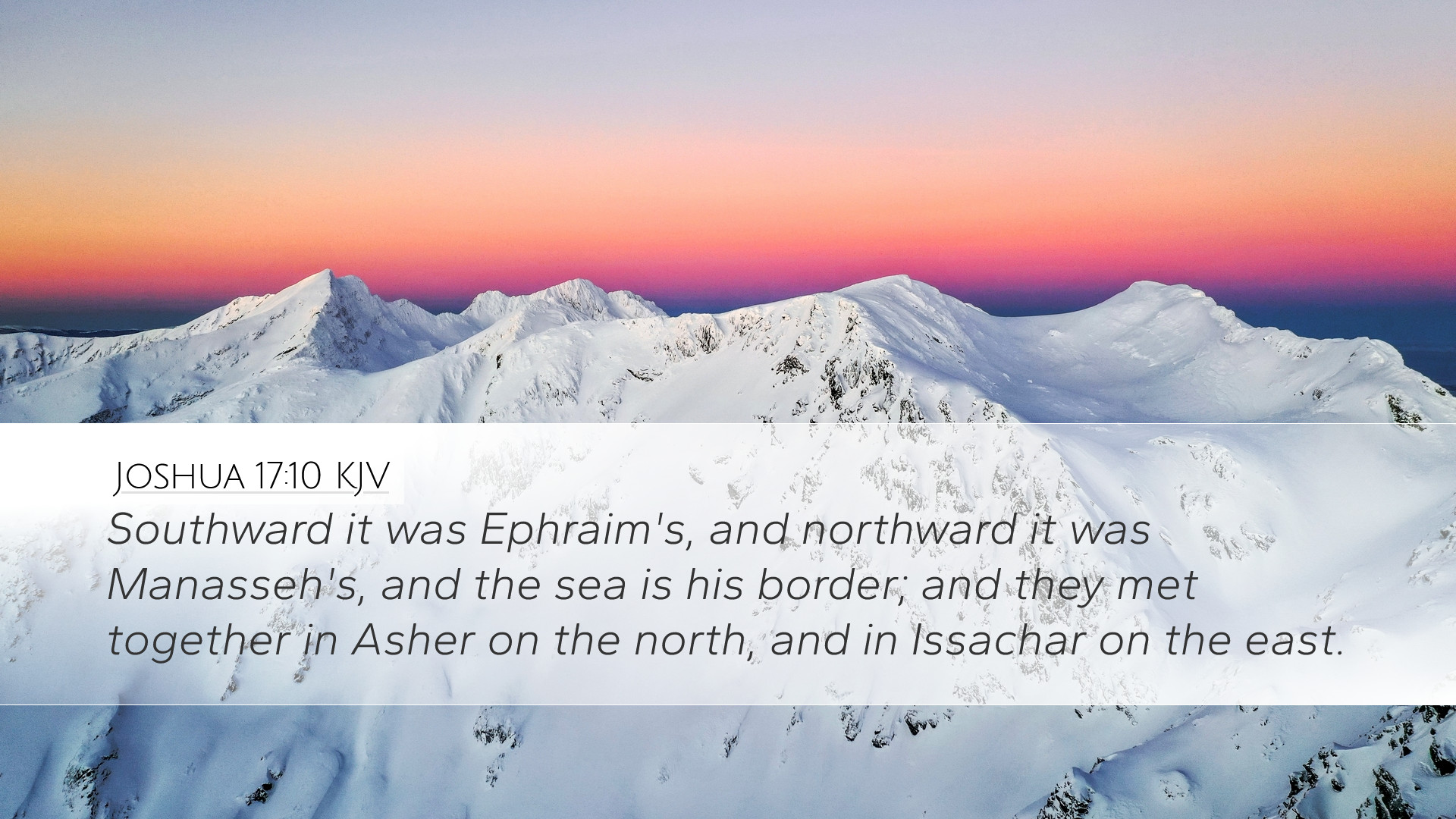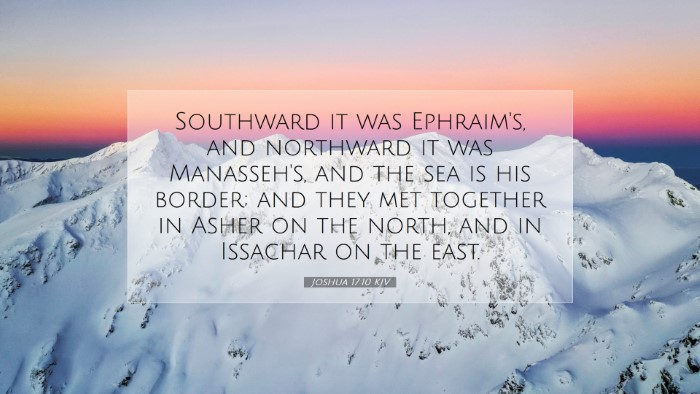Old Testament
Genesis Exodus Leviticus Numbers Deuteronomy Joshua Judges Ruth 1 Samuel 2 Samuel 1 Kings 2 Kings 1 Chronicles 2 Chronicles Ezra Nehemiah Esther Job Psalms Proverbs Ecclesiastes Song of Solomon Isaiah Jeremiah Lamentations Ezekiel Daniel Hosea Joel Amos Obadiah Jonah Micah Nahum Habakkuk Zephaniah Haggai Zechariah MalachiJoshua 17:10
Joshua 17:10 KJV
Southward it was Ephraim's, and northward it was Manasseh's, and the sea is his border; and they met together in Asher on the north, and in Issachar on the east.
Joshua 17:10 Bible Commentary
Commentary on Joshua 17:10
Joshua 17:10 states, "Southward was Ephraim's, and northward was Manasseh's, and the sea is his border." This verse is integral to understanding the territorial divisions of the tribes of Israel, as they settled in the Promised Land. It emphasizes the geographical boundaries assigned to the tribes of Ephraim and Manasseh, two tribes derived from Joseph, and their roles in the unfolding narrative of Israel.
Overview of the Context
In examining Joshua 17:10, it is essential to consider the broader context surrounding the division of the land among the tribes of Israel under Joshua's leadership. After entering the Promised Land, Israel was tasked with conquering and settling the land, a mission encapsulated in the divinely appointed leadership of Joshua. This verse appears within a discourse on the inheritance of the tribe of Manasseh, as it receives its allotment alongside Ephraim as one of the sons of Joseph.
Insights from Matthew Henry
Matthew Henry, in his commentary, takes note of the geographical significance of the division of land. He highlights that Ephraim and Manasseh symbolize the fruitful prosperity promised to Joseph. The allocation of territories is not just a matter of land but represents a fulfillment of God’s promise to Israel. The southward positioning of Ephraim illustrates the blessings they would receive, while the northward positioning of Manasseh indicates a broader potential for expansion and influence.
- Contrast Between the Tribes: Henry emphasizes the differences in terrain and culture between the southland (Ephraim) and the northland (Manasseh), which impacted the tribes' experiences and relationships with each other.
- Inherent Spiritual Implications: He proposes that the northward and southward distinctions also reflect the spiritual endeavors of both tribes; where Ephraim perhaps represents an active faith, Manasseh faces challenges of identity amid its vast inheritance.
Insights from Albert Barnes
Albert Barnes approaches the verse by examining the implications of territory in terms of tribal identity and heritage. He notes that the narrative of Joshua 17 underscores the complex relationship between the clans and sub-tribes of Manasseh, significantly emphasizing its extensive borders and boundaries.
- Tribal Identity and Unity: Barnes highlights that both Ephraim and Manasseh, as descendants of Joseph, foreshadow a unified strength amidst diversity. Their distinct territories, however, raise questions regarding unity and collaboration.
- God’s Promises Fulfilled: It is insightful that Barnes reminds readers that despite the apparent struggles for territory, God's promises remain intact. The location of these tribes affirms the divine guidance throughout Israel’s journey.
- Historical Context: He elucidates upon the historical background of the tribes, asserting that Manasseh’s larger allocation speaks to the need for vigilance against encroachment from other tribes, illustrating the necessity for strong leadership.
Insights from Adam Clarke
Adam Clarke provides a detailed examination of the geographical aspects and implications surrounding Joshua 17:10. He assesses how the land's topography influenced the daily lives and spiritual practices of the tribes.
- Geographical Diversity: Clarke identifies that the mention of the sea’s border indicates a rich environment, with coastal access providing both challenges and opportunities for trade and interaction with neighboring nations.
- Spiritual Reflection: He takes a spiritual angle in his assessment, interpreting that the locations of these tribes serve as a metaphor for the diversity of the Christian faith - encompassing both the calm and tumult of life, represented by the sea and the inland territories.
- Leadership and Responsibility: Clarke underscores the importance of leadership in managing such a diverse landscape, as both tribes would need to navigate complex relationships with other Israelite tribes and independent nations.
Theological Reflections
The implications of Joshua 17:10 extend beyond simple geography. This verse serves as a metaphor for God's providential care for His people. Each tribal allocation signifies not only territorial authority but also a call to stewardship. Understanding these intricate dynamics allows for deeper theological reflections around the themes of unity in diversity, leadership under God’s promise, and the spiritual responsibilities that come with blessings.
Practical Applications
For pastors, students, theologians, and Bible scholars, Joshua 17:10 serves as an affirmation of God’s faithfulness through the ages. The careful considerations of territory and identity found in this scripture encourage leaders to seek unity and collaboration even among diverse groups within the Church.
- Unity in Diversity: Like Ephraim and Manasseh, communities of faith today must embrace diversity while pursuing common goals.
- Stewardship: Reflect on the responsibilities that come with blessings—how should Christians manage their 'inheritance' both spiritually and materially?
- Leadership: Assess how leaders can navigate challenges and cultivate environments of collaboration and unity within their congregations.
Conclusion
Ultimately, Joshua 17:10 encapsulates a wealth of insights on the intricate relationship between geography, identity, and faith. This verse challenges readers to recognize God's ongoing work through history and His unwavering promise to care for and mold a people distinguished by their faith and unity. Through the careful study of this scripture, one can glean profound theological truths relevant not only in the historical context of Israel but also in the contemporary Christian walk.


